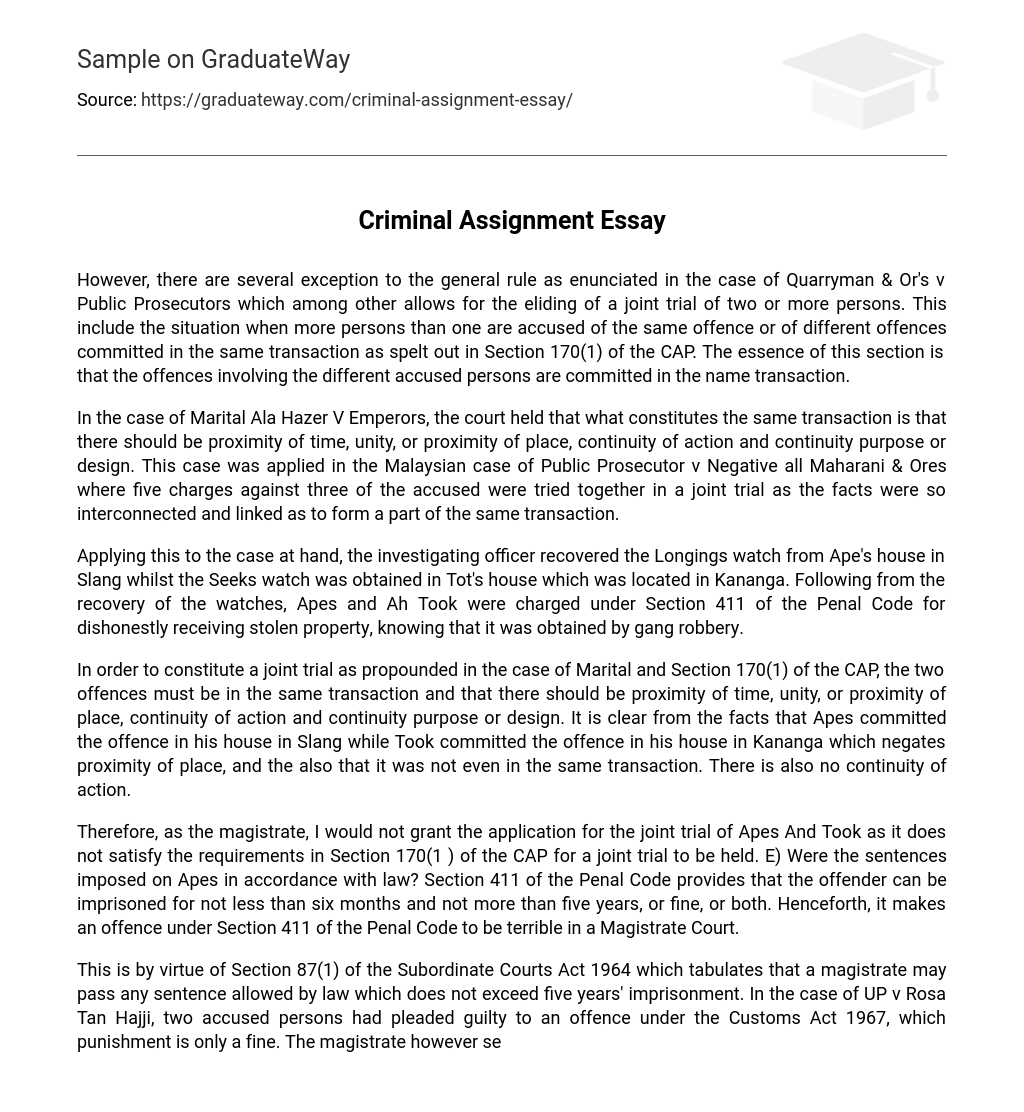However, there are several exception to the general rule as enunciated in the case of Quarryman & Or’s v Public Prosecutors which among other allows for the eliding of a joint trial of two or more persons. This include the situation when more persons than one are accused of the same offence or of different offences committed in the same transaction as spelt out in Section 170(1) of the CAP. The essence of this section is that the offences involving the different accused persons are committed in the name transaction.
In the case of Marital Ala Hazer V Emperors, the court held that what constitutes the same transaction is that there should be proximity of time, unity, or proximity of place, continuity of action and continuity purpose or design. This case was applied in the Malaysian case of Public Prosecutor v Negative all Maharani & Ores where five charges against three of the accused were tried together in a joint trial as the facts were so interconnected and linked as to form a part of the same transaction.
Applying this to the case at hand, the investigating officer recovered the Longings watch from Ape’s house in Slang whilst the Seeks watch was obtained in Tot’s house which was located in Kananga. Following from the recovery of the watches, Apes and Ah Took were charged under Section 411 of the Penal Code for dishonestly receiving stolen property, knowing that it was obtained by gang robbery.
In order to constitute a joint trial as propounded in the case of Marital and Section 170(1) of the CAP, the two offences must be in the same transaction and that there should be proximity of time, unity, or proximity of place, continuity of action and continuity purpose or design. It is clear from the facts that Apes committed the offence in his house in Slang while Took committed the offence in his house in Kananga which negates proximity of place, and the also that it was not even in the same transaction. There is also no continuity of action.
Therefore, as the magistrate, I would not grant the application for the joint trial of Apes And Took as it does not satisfy the requirements in Section 170(1 ) of the CAP for a joint trial to be held. E) Were the sentences imposed on Apes in accordance with law? Section 411 of the Penal Code provides that the offender can be imprisoned for not less than six months and not more than five years, or fine, or both. Henceforth, it makes an offence under Section 411 of the Penal Code to be terrible in a Magistrate Court.
This is by virtue of Section 87(1) of the Subordinate Courts Act 1964 which tabulates that a magistrate may pass any sentence allowed by law which does not exceed five years’ imprisonment. In the case of UP v Rosa Tan Hajji, two accused persons had pleaded guilty to an offence under the Customs Act 1967, which punishment is only a fine. The magistrate however sentenced them both to six months’ of imprisonment and on top of that fined them ARM 10,000. 00.
Upon appeal at the High Court it was held that there was no provision for imposing sentence of imprisonment and thus the magistrate had acted ultra fires the sentencing power which was conferred upon him. Another constraint is hat the punishment imposed, even if it is of the type permitted under the penal section must not fall outside the minimum and maximum limits prescribed. In ABA Seaman v APP, the offender was sentenced to five days’ imprisonment and ARM 100 fine in default two weeks imprisonment for the offences under the Election Act 1854.
Section 11(1) of the Act provides that the offender shall be liable to imprisonment for 12 months and to fine of not less than ARM 250 and not exceeding ARM 1,000. 00. On appeal, it was held that the minimum fine should be REARM if a fine was thought appropriate. In this matter, Apes was intended to six years imprisonment and one stroke of the whip for stealing the Role and six months imprisonment for stealing the Longings watch.
The sentence for the Role given by the magistrate is clearly above the maximum punishment accorded by the law which does not prescribe whipping as a punishment. However so, with regards to the offence of stealing the Longings watch, it is well within what is prescribed by the law which allows six to five years of imprisonment. Thus, the punishment for the Role watch is not according to the law, while the sentence for the Longings watch is in accordance with the law.





